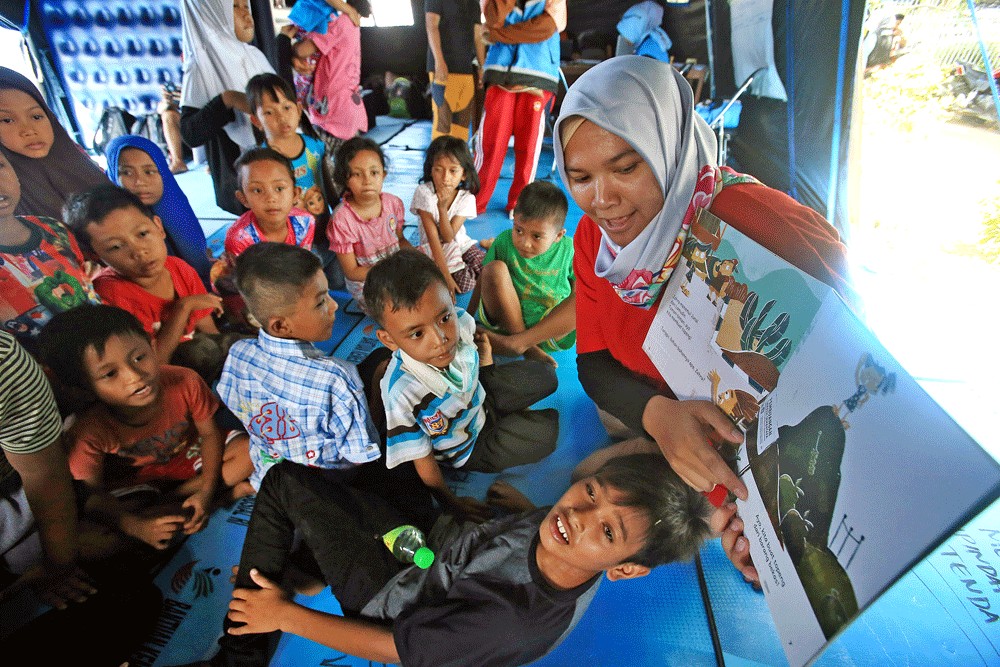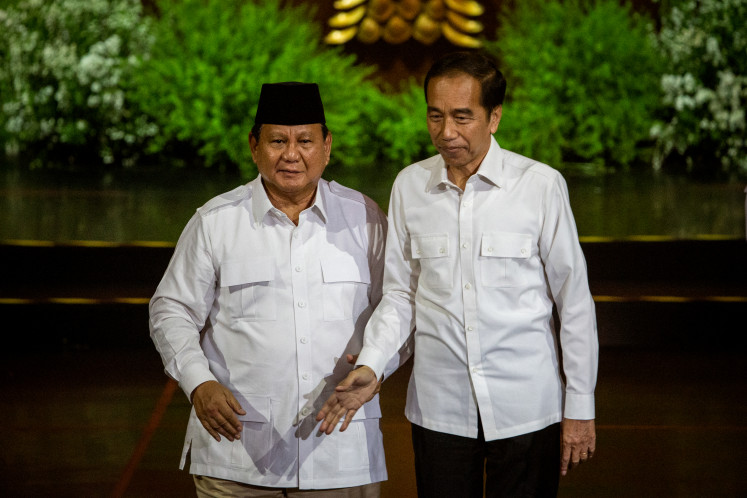Popular Reads
Top Results
Can't find what you're looking for?
View all search resultsPopular Reads
Top Results
Can't find what you're looking for?
View all search resultsOur careless living is costing the people of Palu
Thousands of fellow Indonesians have died; why is it so hard to unite?
Change text size
Gift Premium Articles
to Anyone
 Story time: Children living in a shelter in Palu, Central Sulawesi, listen to a story read aloud by a volunteer working with the Social Affairs Ministry’s post-disaster counseling team on Saturday. The ministry has dispatched a number of special teams to Central Sulawesi to help children who have experienced trauma after a 7.4-magnitude earthquake hit the province on Sept. 28 by providing activities to cheer them up and help them study while living in the shelters. (The Jakarta Post/Dhoni Setiawan)
Story time: Children living in a shelter in Palu, Central Sulawesi, listen to a story read aloud by a volunteer working with the Social Affairs Ministry’s post-disaster counseling team on Saturday. The ministry has dispatched a number of special teams to Central Sulawesi to help children who have experienced trauma after a 7.4-magnitude earthquake hit the province on Sept. 28 by providing activities to cheer them up and help them study while living in the shelters. (The Jakarta Post/Dhoni Setiawan)
T
here is no better mix for a media sensation than a fiery political battle, natural disaster, social chaos, narcissistic media trolls, millions of irresponsible netizens and careless leaders. In Indonesia, it all boiled down within just a single week.
All this was because of the carelessness of our leaders, both in the government and opposition. It was the type of carelessness that shouldn’t be exercised by people responsible for the lives of millions of Indonesians.
The week started in Palu, Central Sulawesi which along with Donggala and Mamuju in West Sulawesi was hit by a series of earthquakes and tsunami on Friday, Sep. 28.
While visiting the affected area, Home Affairs Minister Tjahjo Kumolo stated that people could take the food at minimarkets and government would pay for it. The news then widely spread, apparently leading to more looting than earlier, sparking a huge debate on disaster management and mitigation effort.
Tjahjo’s statement is wrong on many levels. Not only do economists disagree with food looting, most would not even agree with government regulations to prevent price gouging or prices that are excessive, that usually happens before or after a natural disaster. The first thing you need after a disaster is not to order people to take whatever they want, but rule and order amid the chaos so relief plans can be executed in a professional, orderly manner. The market price mechanism during a disaster will also be helpful in providing information about for whom and where the relief should be deployed.
Latter Tjahjo said his statement had been taken out of context. Still, such recklessness is unacceptable from individuals whose words would be taken seriously by the public.
After videos and news about looting went viral, netizens started to blame the government. As general elections are just around the corner, the opposition did not wait to join the blame game.
Then another news item broke out. Photos of an outspoken critic, Ratna Sarumpaet, went viral. In the picture, the playwright’s face was swollen due to an alleged assault. Several fellow opposition figures like Hanum Rais, Rachel Maryam and Fadli Zon quickly came to her defense. Presidential candidate Prabowo Subianto condemned the attack, branding it as a cowardly human rights violation targeted to a defender of democracy, and that he would personally meet the National Police chief to ensure the case was resolved.
Attack on an opposition figure is clearly a serious allegation. Yet amid the uproar and controversies the National Police released a report with evidence that Ratna had not been assaulted and that her swollen face was an after effect of facial surgery. She apologized, branding herself as “the country’s best hoax producer”.
The opposition now look more foolish than the legendary naked emperor. How come? Have we all become victims of sensationalization? How can we and our leaders be so careless?
These two events happened within less than a week. The up and down tide of media battle is even stranger than fiction -- the misunderstood statement of a minister, and a hoax that not only fooled the nation, but drew too much precious time amid the disasters. Beyond the façade of political intrigue, the sad truth is that hundreds of thousands of our fellow Indonesians are still in real suffering.
Imagine if our minister chose his words more carefully. Imagine if the opposition leaders filtered the information more wisely. Imagine if netizens were more responsible in sharing information. We wouldn’t have spent precious time quarreling about a meaningless political battle. We could unite as a nation, at least during such a horrendous disaster.
The earthquakes and tsunami happened just two days before Sept. 30, a date that resonates with infamy for Indonesians, as it is the anniversary of a failed coup and ensuing bloodshed. Some irresponsible people use this date as political commodity. More responsible ones will ask us if the date should be used as a time for national reconciliation since the “1965 tragedy”.
But after all these quarrels we need national contemplation instead. We really need a time to look in the mirror and see what we have become; a nation of carelessness. Thousands of fellow Indonesians have died; why is it so hard to unite?
***
The writer is a training and development professional, amateur writer and movie aficionado.









